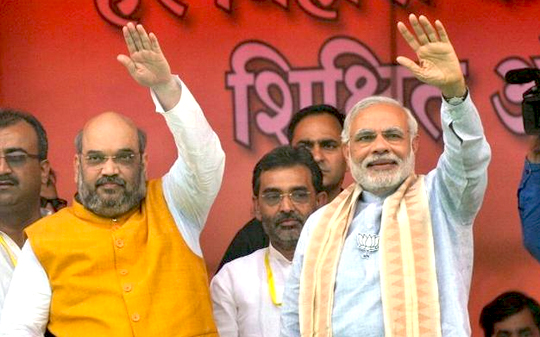New Delhi, Mar 5: Reeling from the fallout of the suicide of Dalit scholar Rohith Vemula and blowback from rural India because of two years of successive drought, the BJP has charted out a series of programmes to address these issues.

According to top sources in the party, at a meeting of party general secretaries held in Delhi and presided over by BJP president Amit Shah last week, it was decided that a week-long programme, commemorating Constitution framer Dr. Bhimrao Ambedkar be held starting from April 14, his birth anniversary.
“There is a growing feeling that Dalits who had in the General Elections of 2014 voted in large numbers for the BJP are not likely to do so in the Uttar Pradesh elections of 2017, where we are seeing a resurgent Bahujan Samaja Party,” said a general secretary who was present at the meeting.
The programme would be about the RSS' concept of “samajik samarasta” or social harmony that had first been articulated in the 1980s by then sarsanghchalak, Balasaheb Deoras.
A booklet, prepared by the RSS, titled Sabhi Hindu Sahodar Hain (all Hindus are brothers and sisters) will also be distributed.
The booklet praises Dr. Ambedkar, and contains the lectures of the late Deoras and Golwalkar denouncing untouchability.
The second set of programmes will start on May 1, when the party intends to launch a series of seminars on the panchayati raj and how best to deal with the impression (after the agitation against the Land Ordinance) that the party was against farmers.
The Union Budget, and its rural focus will also be selling point at these seminars.
“The Uttar Pradesh polls are looming in 2017, and we need to begin work on the ground to counter all this propaganda against us,” said the general secretary.





Comments
First you give Azaadi for Untouchability.
People are started Azaadi from RSS gangs.
Count your days Mr. Shah, this is not encounter.
You cannot fool people of india,but people can fool same as they done in Delhi and Bihar
BJP, please dont bring disunity amongst Indians....we dont need your teaching.....all are well knowledgeable....try to hoist flag in RSS headquarter...if you really love India...
What about Mr. Rohit vemula case. Can u arrest the culprits that is then u talk abt unity. First give the justice to them.
A old plan implementation to fool the Sleeping hindus... I think we should watch what kanaihya speaks after his release in youtu
Add new comment